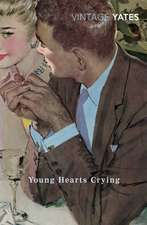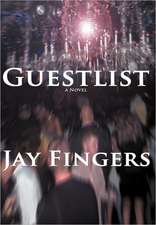A Special Providence
Autor Richard Yatesen Limba Engleză Paperback – 27 iul 2006
| Toate formatele și edițiile | Preț | Express |
|---|---|---|
| Paperback (3) | 53.62 lei 24-30 zile | +19.88 lei 4-10 zile |
| Vintage Publishing – 6 mar 2008 | 53.62 lei 24-30 zile | +19.88 lei 4-10 zile |
| Methuen Publishing – 27 iul 2006 | 55.52 lei 3-5 săpt. | +11.25 lei 4-10 zile |
| Vintage Books USA – 28 feb 2009 | 101.39 lei 3-5 săpt. |
Preț: 55.52 lei
Nou
Puncte Express: 83
Preț estimativ în valută:
10.63€ • 11.05$ • 8.77£
10.63€ • 11.05$ • 8.77£
Carte disponibilă
Livrare economică 24 martie-07 aprilie
Livrare express 07-13 martie pentru 21.24 lei
Preluare comenzi: 021 569.72.76
Specificații
ISBN-13: 9780413775191
ISBN-10: 0413775194
Pagini: 304
Dimensiuni: 129 x 195 x 24 mm
Greutate: 0.27 kg
Editura: Methuen Publishing
Locul publicării:United Kingdom
ISBN-10: 0413775194
Pagini: 304
Dimensiuni: 129 x 195 x 24 mm
Greutate: 0.27 kg
Editura: Methuen Publishing
Locul publicării:United Kingdom
Notă biografică
Richard Yates was born in 1926 in New York and lived in California. His prize-winning stories began to appear in 1953 and his first novel, Revolutionary Road, was nominated for the National Book Award in 1961. He is the author of eight other works, including the novels A Good School, The Easter Parade, andDisturbing the Peace, and two collections of short stories,Eleven Kinds of Loneliness andLiars in Love. He died in 1992.
Extras
Chapter One"Com-mence--fire!"The blast of rifles shocked his ears, right and left; he squeezed the trigger and felt the stock of his own rifle drive hard into his shoulder and cheek, and then he fired again.They were lying prone on a damp Virginia ridge, firing down across a dismal slope of weeds at a simulated enemy position several hundred yards away--a group of crude wooden house fronts flanked by clumps of trees. Gray silhouette targets darted in and out of view at the windows and came irregularly up from foxholes among the trees, and at first Prentice didn't aim at them very precisely: the main thing seemed to be to keep firing, to get off as many rounds as the men on either side of him. But after a few seconds the tension eased off and he became both careful and fast. It was exhilarating."Cease fire! Cease fire! All right, fall back. Everybody back. Second squad, let's go. Second squad up on the line."Prentice locked his rifle, got up, and stumbled back down the ridge with the others to where a small, painstakingly built campfire was struggling for survival. He made his way into the huddle of men surrounding it and found a place to stand beside John Quint."Think you hit anything, Deadeye?" Quint asked him."A couple, I think. I'm pretty sure I got a couple, anyway. You?""Hell, I don't know."It was the last afternoon of the week's bivouac that was the climax of their training. Any day now they would be shipped out for overseas processing, and the company's morale could not have been lower, but Prentice had begun to feel an unreasonable elation. It pleased him to know that he hadn't bathed or changed his clothes for six days, that he was learning to handle his rifle as an extension of himself, and that he'd taken part in elaborate field problems without doing anything noticeably absurd. A pleasant little spasm of shuddering seized him; he squared his shoulders, set his feet wider apart, and briskly rubbed his hands together in the woodsmoke."Hey Prentice," said Novak, who had been watching him from the other side of the fire. "You feeling pretty sharp today? You feeling like a real fighting man?"This caused a chuckle around the group, and Cameron, a big Southerner who was Novak's friend, did his best to keep it going. "Old Prentice gunna be a regular tiger, ain't he? Jesus, I'm glad he's on our side."He tried to ignore them, continuing to rub his hands and stare down into the weak flames, but the sound of their bored, easy laughter had spoiled his mood.Hardly any of the men in his platoon were less than five years older than Prentice; some were thirty and a few were nearly forty, and a more surly, less amiable crowd he could never have imagined. Like him, they had all come to Camp Pickett from other branches of the service--this whole training regiment, in fact, was what the Army called an Infantry Re-Tread Center--but there was a considerable difference between his case and theirs. He was a veteran of nothing more than six weeks of mild and pampered training as an Air Force recruit, followed by a shapeless month of work details in something called a Casual Company; the others were all old-timers. Some were from recently dissolved Anti-Aircraft units, in which they had idled for years at the gun emplacements around West Coast defense plants; some were from Ordnance or Quartermaster depots; there were ex-cooks and ex-clerks and ex-orderlies, and there were washouts from various officer-candidate schools. Many of them were noncoms in line or technical grades and continued to wear their impotent chevrons, but all of them--every foulmouthed, hard-drinking, complaining one of them--had in common the miserable fact that their good deals, their months or years of military safety were over. They were replacement riflemen.And if Prentice had entertained any notion of being called "Bob" or "Slim" or "Stretch" by these men, of relaxing with them in the easy camaraderie of his Air Force days, it was a hope he'd had to abandon at once. They called him "Kid" or "Junior" or "Prentice" or nothing at all, and their general indifference had soon turned into a contemptuous amusement.On the very first morning, late for Reveille and sleepily fumbling with his unfamiliar infantry leggings, he had put the damned things on backwards, with the hook lacings on the inside rather than the outside of his calves; he had taken four running steps across the barracks floor before the lacing hooks of one legging caught the lace of the other, and down he came--all gangling, flailing six-foot-three of him--in a spectacular lock-legged fall that left his audience weak with laughter for the rest of the day.And thereafter he had gone from bad to worse. He was incurably clumsy at close-order drill; he couldn't perform the manual of arms without an unsightly dipping of his head when he wrenched open the rifle's chamber; in the field his spindly, ill-coordinated body was put to tests of reflex and endurance that seemed wholly beyond its powers, and he repeatedly floundered and failed.Worse still, he found himself unable to accept his defeats with any kind of grace. He would rise from each humiliation with a mouthful of shrill obscenities, trying by sheer verbal unpleasantness to beat these laughing bastards at their own game, and the result of this was to lower him still further in their esteem. An all-around incompetent was bad enough, and a wet-behind-the-ears young twerp of an incompetent was worse; but when he turned out to be a little wise guy too--when he swore not only in bad temper but in what sounded like the clipped, snotty accents of a spoiled rich kid--that was too much.And then one morning after bayonet drill, when the company was marched into a stifling clapboard building for its weekly I. and E. lecture, he found a way in which his luck might possibly begin to change. The lecture was as tedious as ever: first a documentary film, thunderously identified on the screen as one of the Why We Fight series, which explained the evils of Nazi Germany in simple-minded words and pictures; then a droning talk by a bored-looking second lieutenant who explained it all over again, and then the question period.A man several seats away from Prentice got up to raise a question--a quiet ex-Ordnance man from Idaho whom he'd sometimes noticed smoking a pipe in the post library, a man named John Quint--and from the moment he began to talk Prentice sat spellbound."I'd like to take issue, sir, with one or two of the points made in the movie just now. Actually, they're things I've noticed cropping up time and again in the Army's indoctrination program, and I think we might do well to examine them a little more closely..."It wasn't what he said that mattered, though all of it was interesting and thoughtful; it was the remarkable ease and confidence of his delivery. Here was a man who couldn't have been more than twenty-four or five--and a bespectacled, almost prissy-looking man at that, a man whose vocabulary and enunciation clearly marked him as "cultivated"--and without the slightest compromise, without any hint of talking down to them, he was holding the respectful attention of every muscle-headed slob in the room. He even got a few laughs--not by any clumsy descent into G.I. humor, but by urbane and witty turns of phrase that Prentice would have thought to be miles over their heads. Hooking his thumbs in his cartridge belt, courteously turning from one section of his audience to another as his glasses gleamed in the lights, he was using words like "ludicrous" and "corruptible" with the dark sweat of the day's bayonet drill still staining his back: he was proving that you didn't have to be a lout to be a soldier.When he finished and sat down, there was a spatter of applause."Yes," the lieutenant said. "Thank you. I think that was very well put. Are there any other questions?"That was all, but it was enough to give Prentice a sharp new focus for his yearnings. He knew what he wanted in the Army now. The hell with this childish nonsense of being "liked" or "disliked," of being "accepted" or not. All he wanted now, beyond a certain basic competence, was to be as intelligent and articulate as Quint, as independent as Quint, as aloof from the Army's indignities as Quint. He very nearly wanted to be Quint, and at the very least he wanted to get to know him.But the fool of the platoon could hardly buddy up with its one and only intellectual--not, at least, right off the bat. It was a thing that would have to be pursued very cautiously, and with no visible effort at pursuit.It began that very evening, when he strolled over to Quint's bunk for a desultory chat and was careful to walk away again before there could be any hint of his imposing. Several nights later he saw Quint reading in the library but thought better of going over to start another conversation, though he was careful to display the title of the rather highbrow book he was carrying, in case Quint happened to look up as he passed by on his way to the charge-out desk. Then, luckily, the company began its week of training on the rifle range, marching out there before dawn each morning for a nine-hour session with the targets, and this routine left long conversational openings in the middle of the working day. There were whole half-hours with nothing to do but sit around and wait for your turn on the firing line, and there was even more leisure during the noon meal, which was served in mess kits from a mobile field kitchen. Prentice made the most of those chances; it wasn't long before he and Quint were pairing off at each break, almost as a matter of course. Then when the company went out on bivouac they pitched their shelter halves together and shared the cramped, wet, two-man discomfort of a pup tent in which they both developed chest colds.By now they had grown as close as members of the same unhappy family, but Prentice knew they couldn't yet be accurately described as friends, let alone as "buddies." They didn't even look right together: Prentice was at least nine inches too tall, with a small, large-eyed face still nakedly eager for approval; Quint was solid and settled in chronic exasperation.As they trudged side by side in a column of twos for the five-mile march back to the barracks, under full field packs, Prentice was determined not to open any conversation. If they were going to talk at all, Quint would have to start it; and at least two and a half miles of silence went by before Quint said, "Cherrystone clams.""What?""Just thinking about a meal I had once in San Francisco." Quint winced in tiredness as he eased his rifle sling into a more comfortable place on his shoulder. "Best damn restaurant I've ever been to in my life, only I can't remember the name of it. You ever have cherrystone clams? On the half shell?"And soon they were engaged in what promised to be a long, wistful discussion of the ultimate and perfect dinner, a dinner presumably to be shared some day after the war in the best damn restaurant in the world. It would begin with cherrystone clams and proceed to a celebrated kind of soup that only Quint had ever tasted."Okay," Prentice said, "and then what? A big steak, I guess, or a big piece of roast beef with--""No. Hold on a second, Prentice; don't let's bolt the whole meal at once. You're forgetting all about the fish course.""Okay." And as they debated possibilities for the fish course it was all Prentice could do to keep his voice from rising and giggling in pleasure like a girl's."Then we're agreed on fillet of sole, right?" Quint said. "All right, now it's time for the main dish. And listen, don't let's be too hasty about the steak or the roast beef--there's plenty of other things. Let's think a minute."Prentice thought a minute, and while thinking, he allowed one of his worst military habits to repeat itself. His toe scraped the heel of the man walking ahead of him, an ex-Engineer corporal named Connor whose heels, as he often and loudly told everyone, had been stepped on by Prentice every God damned time Prentice followed him in the marching order. And because Prentice had long since learned that no kind of apology would work with Connor, he could only assume a grave and self-protective look of idiocy when Connor turned around and said, "God damn it, Prentice, will you watch your feet?" There followed a silence of ten or twelve paces, while Prentice wondered how soon it would be all right to resume the talk of the ideal dinner.It was Quint, gratifyingly, who broke the silence, "Come to think of it," he said, "I guess you're right, Prentice. There isn't anything better than a steak. Let's make it two filet mignons, then, medium rare. And what'll we have on the side? French fries, I guess, but I mean what kind of vegetable? Or would you rather skip the vegetable and have a salad?""Right. Let's do that. Let's just have a big sal--" and then, hating himself, he stepped on Connor's heel again. But there was barely time for Connor to turn around and say, "Prentice, will you watch your fucking feet?"--there was barely time for that before Prentice saw something funny in the movements of the men ahead. Far up in front, where the captain was, they had all hunched over and broken into a trot, and they seemed to be taking off their helmets. Nearer, just ahead of Connor, some of them had stopped and buckled over as if in pain; and then, before he could bring his mind into focus, something small and indistinct fell into the dust at his feet and exploded with a soft little noise--Pluff!--and his eyes and throat were attacked by fire.He couldn't see and he couldn't breathe. He crouched, both hands grabbing for his eyes as his rifle swung clumsily loose at his elbow."Keep moving, men," somebody was calling. "Keep moving..."Stumbling and pushed heavily from behind, he lost his balance and fell on the road and rolled, legs in the air--all this happened before the first clear thought occurred to him: Tear gas.And it was an agonizingly long time after that, while he scrabbled on all fours to retrieve his rolling helmet, before he thought of what to do about it--before his right hand clawed at the canvas pouch that had ridden under his left armpit for weeks, tore it open, and pulled out the wobbling rubber paraphernalia of his gas mask.
Recenzii
“Soft-spoken in his prose and terrifyingly accurate in his dialogue, Yates renders his characters with such authenticity that you hardly realize what he's done.” —The Boston Globe"One of America's best-kept secrets. . . . Keenly insightful, brutally honest...delivering a swift kick to the heart." —The Denver Post“Yates writes powerfully and enters completely and effortlessly into the lives of his characters.” —The New York Times Book Review
















